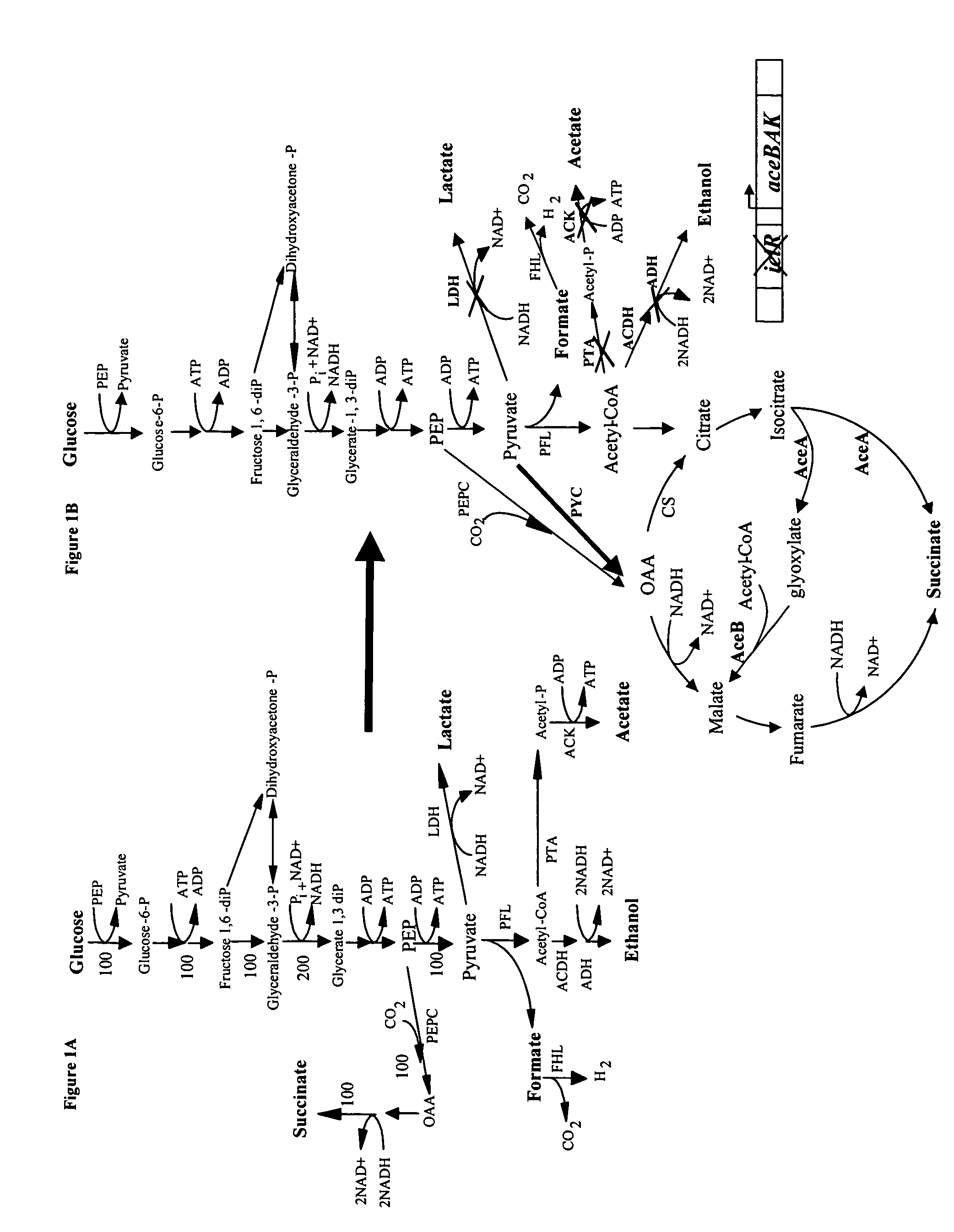Mutant E. coli strain with increased succinic acid production
- Summary
- Abstract
- Description
- Claims
- Application Information
AI Technical Summary
Benefits of technology
Problems solved by technology
Method used
Image
Examples
example 1
Removal of NADH Competing Pathways
[0034] Alcohol dehydrogenase (adhE) and lactate dehydrogenase (ldhA) activity was reduced in SBS110MG to address the loss of NADH to the production of alcohol and lactate at the expense of succinate (39). SBS110MG (pTrc99A) consumed 11% of the initial glucose with low succinate yield and high acetate yields.
example 2
Expression of Pyruvate Carboxylase
[0035] Expression of the heterologous PYC from Lactococcus lactis (plasmid pHL413) helps to increase the OAA pool by the direct conversion of pyruvate into OAA, which serves as a precursor of the glyoxylate and fermentative pathway, both of which lead to succinic acid production as depicted in FIG. 1. Strain SBS990MG showed lower ICL and MS activities than SBS330MG (pHL413) and SBS550MG (pHL413) as expected due to an active iclR, however, the basal enzyme levels seem to be sufficient to drive the glyoxylate pathway.
[0036] The heterologous expression of PYC in succinate producing E. coli strains increases the flux from pyruvate to OAA. PYC diverts pyruvate toward OAA to favor succinate generation. SBS110MG harboring plasmid pHL413, which encodes the heterologous pyruvate carboxylase from L. lactis, produced 15.6 g / L (132 mM) of succinate from 18.7 g / L (104 mM) of glucose after 24 h of culture in an atmosphere of CO2 yielding 1.3 mol of succinate pe...
example 3
Activating the Glyoxylate Shunt
[0037] The inactivation of ICLR diverts acetyl CoA towards the production of succinic acid by activation of the aceBAK operon thus decreasing the carbon flux through acetate and continuing the recycling of acetyl CoA. In strain SBS330MG (pHL413) ACK-PTA is active and therefore little flow of carbon is diverted to the glyoxylate even when this pathway had been genetically activated. The activity of the glyoxylate pathway is evidenced by the higher enzyme activity showed by this strain with respect to the wild type control (data not shown). The strains with higher ICL and MS activities were SBS330MG (pHL413) and SBS550MG (pHL413). These strains showed more than twice the activity of the wild type strain. Strain SBS330MG was created as an intermediate strain by inactivating the iclR gene in adh, ldh mutant, SBS110MG. In an ldhA adhE mutant acetyl-CoA is diverted towards the glyoxylate pathway therefore reducing acetate excretion. Even when the glyoxylate...
PUM
| Property | Measurement | Unit |
|---|---|---|
| Fraction | aaaaa | aaaaa |
| Fraction | aaaaa | aaaaa |
| Fraction | aaaaa | aaaaa |
Abstract
Description
Claims
Application Information
 Login to View More
Login to View More - R&D
- Intellectual Property
- Life Sciences
- Materials
- Tech Scout
- Unparalleled Data Quality
- Higher Quality Content
- 60% Fewer Hallucinations
Browse by: Latest US Patents, China's latest patents, Technical Efficacy Thesaurus, Application Domain, Technology Topic, Popular Technical Reports.
© 2025 PatSnap. All rights reserved.Legal|Privacy policy|Modern Slavery Act Transparency Statement|Sitemap|About US| Contact US: help@patsnap.com



